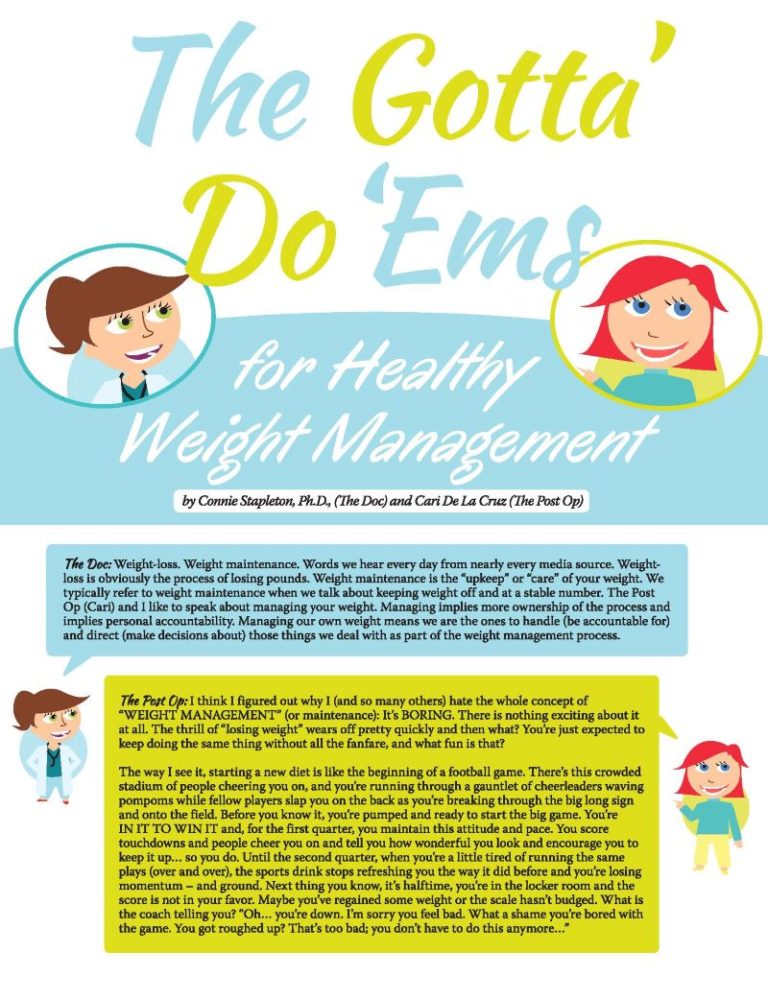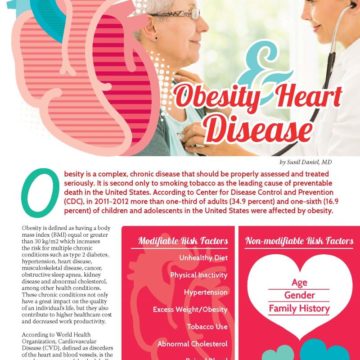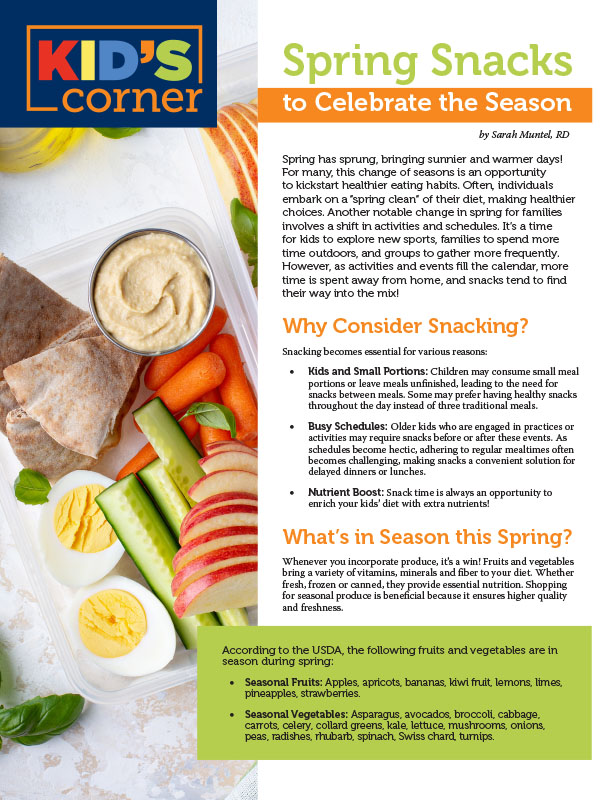The Gotta’ Do ‘Ems for Healthy Weight Management


by Connie Stapleton, Ph.D., (The Doc) and Cari De La Cruz (The Post Op)
Spring 2015
The Doc: Weight-loss. Weight maintenance. Words we hear every day from nearly every media source. Weight-loss is obviously the process of losing pounds. Weight maintenance is the “upkeep” or “care” of your weight. We typically refer to weight maintenance when we talk about keeping weight off and at a stable number. The Post Op (Cari) and I like to speak about managing your weight. Managing implies more ownership of the process and implies personal accountability. Managing our own weight means we are the ones to handle (be accountable for) and direct (make decisions about) those things we deal with as part of the weight management process.
The Post Op: I think I figured out why I (and so many others) hate the whole concept of “WEIGHT MANAGEMENT” (or maintenance): It’s BORING. There is nothing exciting about it at all. The thrill of “losing weight” wears off pretty quickly and then what? You’re just expected to keep doing the same thing without all the fanfare, and what fun is that?
The way I see it, starting a new diet is like the beginning of a football game. There’s this crowded stadium of people cheering you on, and you’re running through a gauntlet of cheerleaders waving pompoms while fellow players slap you on the back as you’re breaking through the big long sign and onto the field. Before you know it, you’re pumped and ready to start the big game. You’re IN IT TO WIN IT and, for the first quarter, you maintain this attitude and pace. You score touchdowns and people cheer you on and tell you how wonderful you look and encourage you to keep it up… so you do. Until the second quarter, when you’re a little tired of running the same plays (over and over), the sports drink stops refreshing you the way it did before and you’re losing momentum – and ground. Next thing you know, it’s halftime, you’re in the locker room and the score is not in your favor. Maybe you’ve regained some weight or the scale hasn’t budged. What is the coach telling you? “Oh… you’re down. I’m sorry you feel bad. What a shame you’re bored with the game. You got roughed up? That’s too bad; you don’t have to do this anymore…”
Are you kidding? No! If he’s a good coach, he’s going to be firm and fair and say things like: “C’mon!
You know what to do! Dig deeper! Keep going!” Your job is to get back on that field, win that game so you can play another game, and keeping winning.
It’s the same thing with dieting. In the beginning, you get fun new tote bags and journals, colorful posters, maybe a t-shirt, exciting snack foods and a shaker bottle. You’ve got a whole team of people cheering you on, telling you how great you’ll do – just stick to the game plan, follow the rules, don’t give up, and keep coming back. But…do you? Once the novelty of losing weight wears off and maybe you stop losing (or begin to regain), what happens? Do you go back to the “locker room?” No! Why not? Because the coach is going to tell you the same thing The Doc is gonna tell you: You’re not following the rules you promised you’d follow. You said you were in it to win it and you’d do whatever it takes. Well…are you? What rules?
The Doc: Before we get into the list of well-researched ways (the “rules”) to healthfully manage your weight, let’s note some ways you successfully manage many other areas of your life. If you have children and are able to get them where they need to be at the times they need to be there, then you successfully manage time and schedules. Whether you work outside the home or inside the home, keeping up with laundry, groceries, and “work” demands, deems you successful as a manager of life. Many people participate in personal hobbies, book clubs or support groups, which also shows proof of your ability to manage multiple areas of life. However, when it comes to managing weight, people sometimes feel “incapable” of doing so based on past attempts to keep their weight at a healthy level (meaning a weight where your health is not negatively impacted and where you can do many of the things you want to do).
The Post Op: It’s weird. We are really good at successfully managing many other areas in the game of life. We can do lots of things well (and win), so what is it that makes us believe we can’t manage our weight? Well, I’ve learned from experience (and from The Doc), that what I, as a successful post-op, did to manage my own weight and health (without even knowing it), was to build my self-efficacy. Heck, I’d only ever heard of self-esteem and self-image (two things that weren’t great for me at the beginning of my weight-loss journey, either). So, you can imagine what my self-efficacy (my belief that I could successfully do something) was like… I’d never managed my weight in the past, so what made me think I could do it now? Fortunately, as I lost weight, I gained courage to try new things. I starting going to the gym and doing the elliptical – first 5 minutes, then 10, then an hour. I started doing machines and taking aerobics classes. Some things I liked, some things I didn’t, but I began to believe that I was actually capable of doing a lot more than I’d ever thought. How? Because… I was proving it – every day. Positive experience builds stronger self-efficacy, which means greater likelihood for long term weight management. As it turns out, the things I do to successfully manage a healthy weight are not so different from the things other successful people do.
The Doc: In reviewing the research on weight-loss and weight management, there are a number of proven methods that help in the healthy management of weight. A Post Op & A Doc have compiled these into a list of behaviors we refer to as the “Gotta Do Ems for Healthy Weight Management.” Remember, you are the one who is responsible for managing your weight. You are the one who is accountable for the behaviors you choose and you are the one responsible for directing, or making decisions about when and how often you choose to do the things necessary to manage a healthy weight.
The Post-Op: I know it can be boring and lonely sometimes, which is why you need a good support system consisting of healthy people doing healthy things. I didn’t say they were doing things FOR you, because they can’t workout for you, and they can’t eat your vegetables for you – but they can join you on your walk and show you yummy ways to prepare your veggies. You’ve GOTTA do certain things…but you don’t have to do them alone. Even if you have to do the physical work alone, you can always have that healthy support system encouraging you in the background. That’s why we always say: You can’t do it alone, and no one can do it for you! Here are the tried and true things you’ve GOTTA do to live fully and manage a healthy weight:
Make Healthy Food Choices
The Doc: If you aren’t sure what healthy food choices are, then it is your responsibility to learn. That may mean you start reading or make an appointment with a nutritionist. I always say, My Health = My Responsibility!
The Post Op: I’m no nutritionist, but I can sure talk to one, or find out what other healthy people are doing that works.
The Doc: Portion sizes are definitely something we all need to learn or be reminded of. It seems “portion distortion” is quite a problem for most of us! Finding out the actual healthy portion size of some foods is often shocking to people.
The Post Op: I use those little mason jars with the screw on tops for ½ cup servings because then I don’t have to measure. I just have to fill them up and put ‘em in the fridge or cabinet. You can do this at the beginning of the week and even have your salad fixings ready to go so you don’t have to spend time chopping things up. Measuring doesn’t have to weigh you down if you find ways to manage it.
Exercise Regularly
The Doc: My personal trick for exercising regularly without having a debate in my head about being too busy to exercise or too tired to exercise or too whatever in an attempt to talk myself out of doing so, is to tell myself my mantra about exercise, “It’s what I do.” Oh – and you don’t have to like to exercise to do exercise.
The Post Op: Even though you don’t HAVE to like exercise to do it, you may find yourself more willing to engage in activities you enjoy. I’m not a fan of walking around and around a loop, but I don’t mind hiking (because it’s interesting and the scenery changes). I also like hula hooping and riding my bike. Find fun things you like and have handy go-to routines you can do when time is limited.
Drink Water
The Doc: I definitely had to train myself to form the habit of drinking water. That meant telling myself I had to drink two bottles of water in the morning and two in the afternoon. Now I usually drink even more than that because I love water!
The Post Op: Trust me on this one: if you’re getting enough water in, you’ll become good friends with the bathroom (ha ha)! A really good way to make sure you’re drinking plenty of water is to take your vitamins!
Eat Breakfast
The Doc: Drop the excuses and do this! It doesn’t have to be an ordeal to have breakfast. Eat high-protein 100-calorie Greek yogurt on your way to work. Prepare eggs in advance and heat them up or peel a hard-boiled one. Try natural peanut butter on half of a whole wheat English muffin.
The Post Op: Nobody said you had to eat the instant your feet touch the ground; you can putter around and work your way up to it, or eat (or drink) your breakfast in the car on the way to work. Just do it. Your body will thank you and you won’t be so darned hungry by lunch.
Plan Your Meals and Follow Your Plan
The Doc: Do this one your way. If you need complete structure, then write it all out and follow it. If you hate structure and are constantly on the go, then make a list of 20 quick, healthy things that are your “meals” and make sure you have a few of them at work, in a cooler in the car, or in your purse. Another of my favorite sayings is “work smarter.” Do what you need to do in this area, but definitely do it.
The Post Op: I have a lot of things I “just do” that are easy, and I don’t have to think about it. Be prepared – even when you’re going to a restaurant, you can look at menus online before you get there.
Keep a Food Diary
The Doc: No excuses here, either! There is so much research on the power of this behavior to help in weight management that some suggest if you were to do only one of these behaviors, this is the one to do. You get “just the facts” if you honestly input what you eat and you can easily figure out problem areas and can correct them. With the smart phone apps, there’s really no excuse for not doing this!
The Post Op: This isn’t fun, but it doesn’t have to be a big deal. You can use your smart phone (there’s an app for that) and just pick and choose (or even scan the barcode) for things you eat.
Keep an Exercise Diary
The Doc: Those smart phone apps? They’re perfect for keeping track of your exercise and give you gobs of information about calories burned, etc. Many of the apps track both your food input and exercise on the same app. It doesn’t get much easier than that! If you like old-fashioned, tried and true, paper and pencil, then use those! Just keep track of your exercise.
The Post Op: My co-worker has shown me some super fun smart phone apps for all kinds of work out routines, but if that’s not your speed, just do what I do and “memo” your phone after your work out. I just dictate what I did and how long I did it. Done.
Use a Healthy Support System
The Doc: I can’t say enough about the importance of this. Having people to encourage and support you, which may mean giving you some of the Post Op & the Doc’s “firm and fair” brand of feedback now and then, is a proven way to help successfully manage your weight. It’s difficult to break bad habits, develop healthy new habits and stay motivated. Having others to participate with you, to celebrate with you and to encourage you makes staying on track much easier.
The Post Op: Notice we said HEALTHY support system? That means people who will hold you accountable and not let you off the hook because they “feel bad” for you. Find someone whose schedule and personality matches yours, then pair up. Find someone who is doing what you want and ask to join. Stick with the winners because the winners stick with it. I didn’t make that up, but it’s good.
Get Individual and/or Group Therapy
The Doc: Ok, finding specific research to say that therapy itself affects your weight is tough to do. However, it is proven that the support of programs like Weight Watchers and Overeaters Anonymous help people maintain motivation and feel supported, which does help in sticking with the healthy habits. Plus, there is a lot of research that suggests therapy helps with issues often associated with weight issues, such as improving self-esteem and decreasing symptoms of depression. Anecdotally, I’ve worked with enough patients who have benefitted from the process of therapy in their weight management, that I’m certain of the benefits of therapy in weight management.
The Post Op: Duh. Obviously The Doc is going to say this is important but, guess what? So is The Post-Op. There are REASONS you “don’t wanna” stick with healthy behaviors, make healthy choices, do healthy things and take care of yourself. A good therapist can help you get to the heart of the matter so you’ll stop “stuffing stuff” down. But, I warn you: You’ve gotta be honest, brave and willing to do the work in therapy. It’s not easy – but it’s DEFINITELY worth it.
Conclusion
The bottom line is:
Weight management is accepting personal responsibility and being accountable for making healthy decisions to do what it takes to live at a weight that is healthy for you. You have the information about what is proven to work. The 10 things we listed above are the things you said you’d do when you agreed to have bariatric surgery. You nodded affirmatively when the nutritionist told you how and what to eat for the rest of your life. You gave your doctor the thumbs up when he said you’d have to be active and exercise forever. You pinky-promised the psychologist you’d religiously attend support group forevermore (because successful people do). You swore to your family that this was your last chance, so of course, you’d follow all of the rules.
After all, surgery is a serious decision. So, as a simple “firm and fair” reminder, these 10 things are nothing more than the things you signed up to do!
About the Authors:
Connie Stapleton, PhD, is a licensed psychologist working in the field of addiction and recovery. For more than two decades, Dr. Stapleton has assisted people in improving their physical and psychological health in order to live life more fully.
Cari De La Cruz is a wife, mother, favorite daughter and little sister who hails from a long line of natural redheads and drama queens. In 2007, she had bariatric surgery, lost half her body weight and began writing about her journey online. These days, she spends her spare time writing and speaking about bariatric surgery to a “growing community of shrinking people.” In 2010, she formed APOD with Connie Stapleton, happily becoming the “Post-Op” to her “Doc.”
by Sarah Muntel, RD Spring 2024 Spring has sprung, bringing sunnier and warmer days! For many, this…
Read Articleby Yelena Kibasova Spring 2024 The fitness world is evolving, with new trends and innovations that promise…
Read Articleby Kendall Griffey, OAC Communications Manager Spring 2024 We have officially kicked off Your Weight Matters Regional…
Read Article









